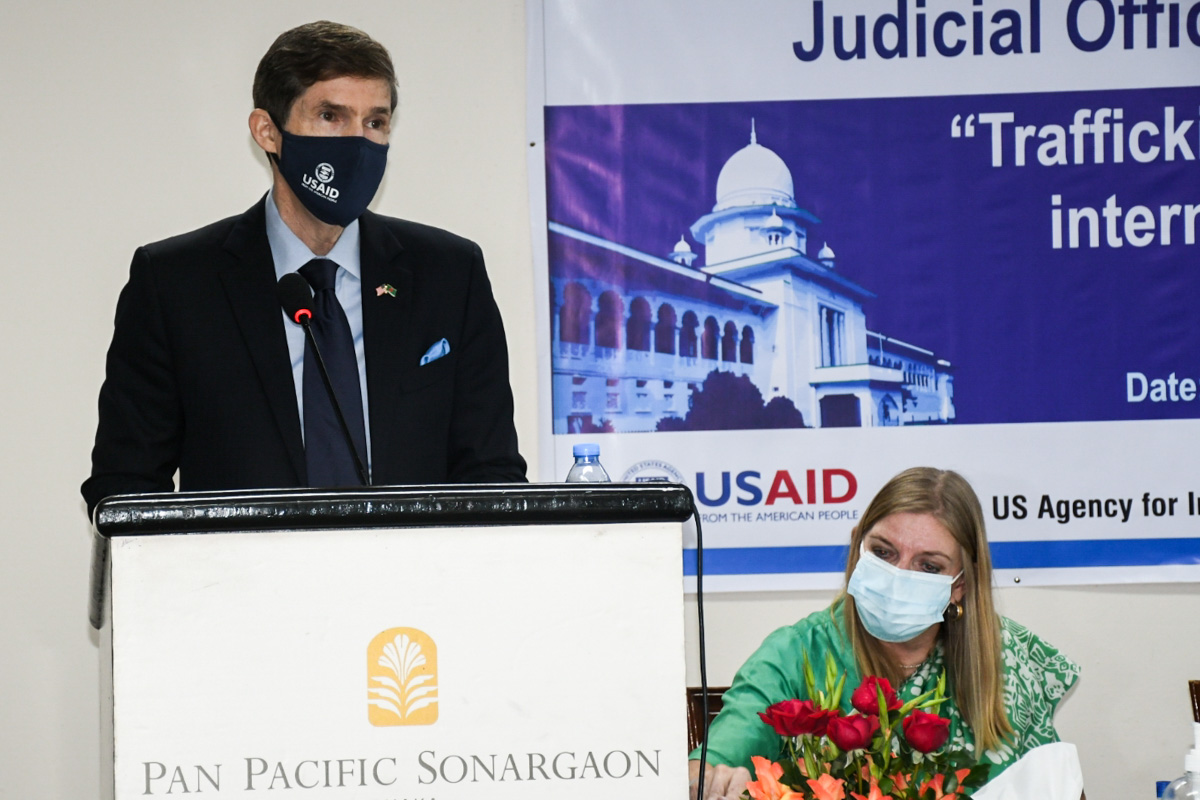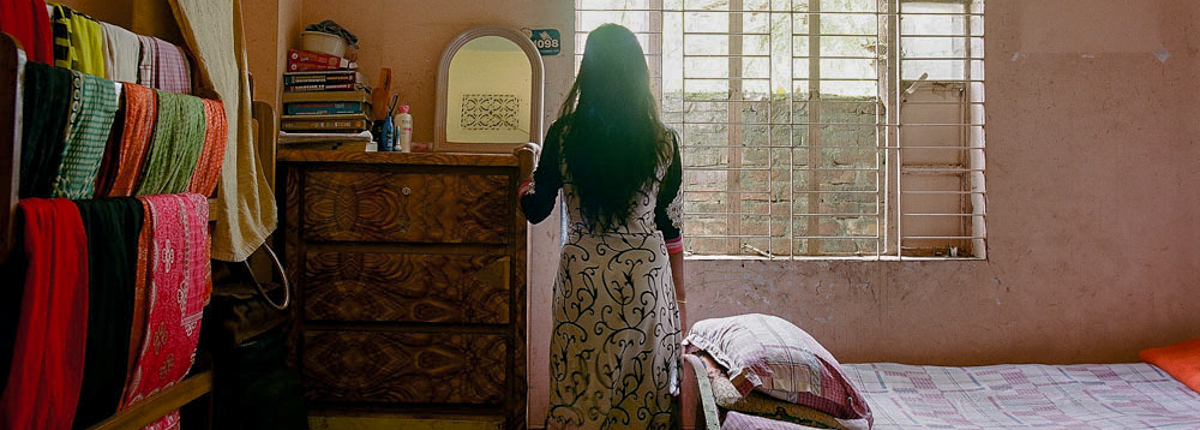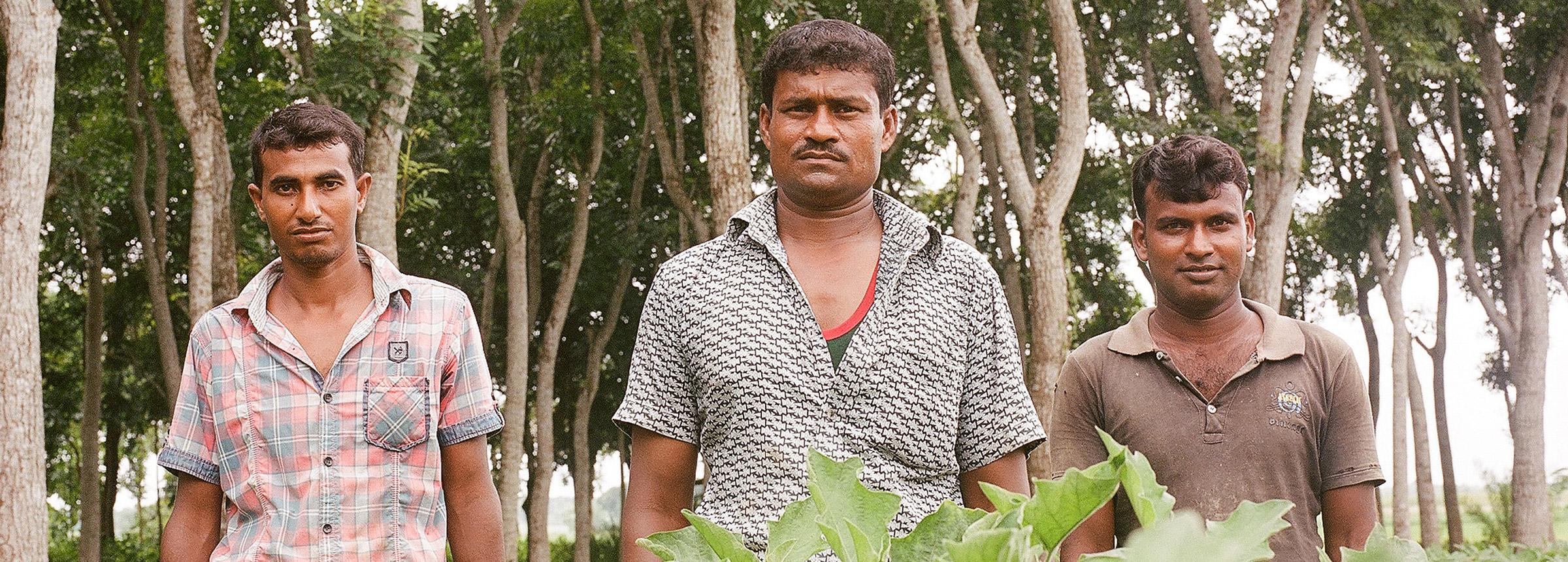
The United States and Bangladesh Combat Human Trafficking
Ambassador Miller and Minister of Law Huq inaugurate a workshop by USAID’s Fight Slavery and Trafficking in Persons project for judges presiding over human trafficking tribunals.
Dhaka, January 12, 2022 – Ambassador Miller and Minister of Law, Justice and Parliamentary Affairs, Anisul Huq, M.P., inaugurated a counter-human trafficking workshop for tribunal judges in Dhaka. The event was jointly organized by Judicial Administration Training Institute (JATI) and the Fight Slavery and Trafficking In-Persons (FSTIP) project and funded by the United States Agency for International Development (USAID). Strong collaboration between the United States and Bangladesh led to the establishment of seven special tribunals to prosecute trafficking-in-persons (TIP) and the implementation of the five-year National Plan of Action to combat human trafficking.
Mr. Anisul Huq, M.P, Honorable Minister, Ministry of Law, Justice and Parliamentary Affairs, inaugurated the orientation program, and Mr. Md. Golam Sarwar, Secretary, Law and Justice Division, Ministry of Law, Justice, and Parliamentary Affairs (MoLJPA) and US Ambassador to Bangladesh H.E. Mr. Earl R. Miller graced the event as special guests. Madam Justice Nazmun Ara Sultana, Director General of JATI chaired the session. Among others, Ms. Liesbeth Zonneveld, Chief of Party, FSTIP Activity and Mr. Md. Golam Kibria, Director (Training) of JATI attended and spoke at the inauguration of the event.
Mr. Anisul Huq, M.P, Honorable Minister, Ministry of Law, Justice and Parliamentary Affairs in his speech said that the new trend of modern slavery could be termed as human trafficking. He further termed human trafficking as an organized crime. He informed the audience that the Government of Bangladesh maintained a zero-tolerance policy against human trafficking. He added that the current government’s commitment to combatting human trafficking is directly linked with its goals of sustainable development.
He further added that it was not possible for the government alone to win the fight against modern slavery and human trafficking, and it was not possible with legislation alone, rather a concerted effort was needed for effectively countering trafficking-in-persons. He further said that Bangladesh has also made a commitment at the international level to combat human trafficking and accordingly ratified the Palermo Protocol of 2000.
He also informed the audience that as result of extensive thoughts and plans of Hon’ble Prime Minister, a committee has been formed under the Ministry of Home Affairs to follow trafficking cases that have been filed. The government also formed CTCs at union, upazila, and district level to ensure victims’ increased access to services including legal assistance. A monitoring cell has been operationalized at the police headquarters to collect and analyze data on human trafficking. We have also set up a seamless intelligence network across concerned law enforcement and border security agencies. As part of the awareness campaigns, counter-trafficking messages are already being disseminated through our partner organization and national media, and other channels, he further added.
He concluded his address saying, “USAID’s Fight Slavery and Trafficking-In-Persons Activity of Winrock International is working in close partnership with the Ministry of Law, Justice, and Parliamentary Affairs, Ministry of Home Affairs with the same objective of the Government to prevent human trafficking”. He thanked USAID, and Winrock International for their continuous support to the Government.
US Ambassador to Bangladesh Mr. Earl R. Miller
Ambassador Miller highlighted U. S. support for Bangladesh’s counter-human trafficking programs. “Working with you to fight human trafficking is a priority of the U.S. Embassy. This workshop reaffirms our commitment to partner with the Government of Bangladesh, civil society, the private sector, and trafficking survivors to end trafficking in persons,” Ambassador Miller said.
“Human trafficking is modern slavery,” Ambassador Miller said. “It has no place in our world. Anywhere.”

U.S. Ambassador to Bangladesh Mr. Earl R. Miller (left) and Liesbeth Zonneveld, Chief of Party of FSTIP Activity (right)
Despite the Prevention and Suppression of Human Trafficking Act of 2012, American and Bangladeshi law enforcement and judicial partners recognize prosecution and conviction rates for human trafficking can be improved. USAID’s $10 million FSTIP project is helping Bangladesh more effectively prosecute and convict human traffickers though training like this week’s workshop for justice sector officers, prosecutors, and judges.
Bangladesh’s attainment of Tier 2 status for the last two consecutive years in the U.S. Department of State’s TIP Report demonstrates the growing success of the U.S./Bangladesh partnership combatting human trafficking.
With U.S. support, the Government of Bangladesh has strengthened the justice sector’s ability to prosecute trafficking offenders. In the past five years, USAID has trained 569 judges and more than 1,000 police, public prosecutors, and lawyers on human trafficking issues so trafficking perpetrators can be caught, tried, and punished. U.S. programs and funding also support community organizations to provide shelter, healthcare, counseling, life-skills and entrepreneurship training, and job placement to over 3,000 trafficking survivors.
At the outset, Liesbeth Zonneveld, Chief of Party of FSTIP Activity made her welcome speech and shared the objectives of the event.
Ambassador Miller; Minister Huq; Md. Golam Sarwar, Secretary, Law and Justice Division, Ministry of Law, Justice, and Parliamentary Affairs; Justice Nazmun Ara Sultana, Director General, Judicial Administration Training Institute (JATI); Md. Golam Kibria, Senior District and Sessions Judge, Director of Training, JATI, spoke at the inauguration of the event.
Adv. Md. Mozahidul Islam, Prosecution Manager, and Md. Nazrul Islam Dipto, Protection Manager, FSTIP Activity facilitated the working sessions that were presided over by Md. Golam Kibria, Director (Training) of JATI.
A total of 23 participants comprising Judges, the Anti-Human Trafficking Offence Tribunal, and Judges from Nari O Shishu Nirjatan Daman Tribunal as they are assigned and empowered the Anti-Human Trafficking Offense Tribunal from the different districts of Bangladesh and faculty members of JATI participated in this event.
Liesbeth Zonneveld, Chief of Party of FSTIP Activity concluded the orientation program with a vote of thanks.
The U.S. government, through USAID, has provided more than $8 billion in development assistance to Bangladesh since its independence. Additionally, the U.S. government has committed $56 million of assistance from multiple agencies to support COVID-19 response efforts. In 2019, USAID alone provided over $200 million to improve the lives of people in Bangladesh through programs that expand food security and economic opportunity, improve health and education, promote democratic institutions and practices, protect the environment, and increase resilience to climate change.
Related Projects

Fight Slavery and Trafficking-in-Persons (FSTIP) Activity
Human trafficking is a major problem in Bangladesh, which is a source, transit, and destination country for men, women and children trafficked into forced labor, commercial sexual exploitation, child marriage and other abusive situations. The COVID-19 pandemic exacerbated vulnerabilities to trafficking, exploitation, and child marriage, as widespread loss of livelihood opportunities and employment, restrictions on […]
